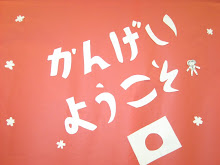Tuesday, February 23, 2010 A Block One Day
Students who want to find out more about "Inside Hana's Suitcase" can visit the website at
www.hanassuitcase.ca
JAPANESE 3 -- First period
3着物:第六課 Plain neg.verb example dialogue on board
B.今日 私 は ともだち と 話しました。
A.何 と 言いました か。
B.ともだち は 「レストラン に 行かない?」と 言いました。
A.そう です か。 行きますか。
B.いいえ、行けない と 思います。
A.行かないで ください。
B.どうして?
A.オリンピック を 見て 下さい。
B.オッケー
Homework is handout from workbook, pages 74 and 80 - 82
Friday we will listen to line-by-line portion of the first photo story.
Each student should start thinking about a Japanese song (NOT one we have sung already) to perform (in Japanese, of course), as karaoke or a cappella, in class. (The Red and White Kohaku show might supply some appropriate songs)
Sally C., Bolero Tohoshinki
Raymond A., Last Train Knot Lamp
Cultural film: Zato-ichi, the Blind Swordsman
Don’t forget the literature-in-translation project. Very important point: DUE DATE IS MARCH 19th AND THERE WILL BE NO EXTENSIONS.
Get started RIGHT AWAY. So far, students have chosen (and received approval) as follows:
Bundit T., Endo Shusaku’s “The Sea and Poison”
Pranee P., Ariyoshi Sawako’s “The Twilight Years”
Esmeralda T., Dazai Osamu’s “Run, Melos! and Other Stories” (a short story collection) (approval is tentative)
Jamie H., Natsume Soseki’s “I Am a Cat” (may change)
Melisa C., Kawabata Yasunari’s “Snow Country”
Susana S., Abe Kobo’s “The Box Man”
D.J. M., Tanizaki Junichiro’s “Naomi” or ….
Sally C., Murasaki Shikibu’s “Tale of Genji” (which translation?)
Karen Y., Mishima Yukio’s “Spring Snow”
Yasmin P., Murasaki Shikibu’s “Diary of Lady Murasaki”
Sofia F., Oe Kenzaburo’s “’Teach Us to Outgrow Our Madness’ and Other Stories”
Tori A., Dazai Osamu’s “The Setting Sun”
Naomi M., Mishima Yukio’s “Confessions of a Mask”
(Sally C. will read Murakami Haruki’s “After Dark” for extra credit)
Continuing to practice plain neg forms of verbs:
Gr. III: しない、来ない(こない)
Gr. II: 食べない、起きない(おきない)
Gr. I: 会わない(あわない)、立たない(たたない)、座らない(すわらない)、読まない(よまない)、とばない、書かない(かかない)、およがない、話さない(はなさない)
Be sure to register with Japanese site on Moodle.
JAPANESE 1 – Fifth period。
Students watched next section of “Come See the Paradise,” taking notes on vocabulary that they heard, for example: ちいさい
U.S. History references to
Wagner Labor Relations Act
Clayton Act of 1949
Characters so far:
Jack, Lily, Minae-chan, Harry, Charlie, Mr. Kawamura, Mr. and Mrs. Matsui, Mr. Ogata
Students have not yet handed in the homework handout – writing sentences with katakana and a few kanji.
Don’t forget hiragana/katakana/kanji writing practice –
1. The name of the dragon is Aki (a hiragana name).
2. Aki is a great dragon from Japan.
3. Aki’s friend (ともだち) is a wild boar of Thailand.
4. The wild boar’s name is Ace (a katakana name).
5. Ace and Aki like shaved-ice かきごおり and sweets.
6. Shaved ice and sweets are delicious.
7. However (でも) fermented soy beans ( なっとう) is yucky-tasting.
8. The Japanese dragon is noisy.
9. The wild boar is a cute (movie) star (katakana word).
10. Ace and Aki’s teacher is Mr. Kawayama.
11. Teacher Kawayama is a gentle history teacher.
12. Teacher Kawayama likes origami.
13. Aki and Ace also like origami.
14. Everybody loves Totoro.
15. Is origami difficult? No, not very...
Be sure to register with Japanese site on Moodle。
JAPANESE 2 Sixth Period
Students listened to the dialogue from the manga in Kimono, pages 62 and 63 in Chapter 5 of text.
Discussion of “adverbs of frequency” and whether they went with affirmative or negative verbs:
よく 食べます (I) often eat.
たいてい 食べます (I)usually eat
ときどき 食べます (I)sometimes eat
いつも 食べます (I)always eat
あんまり 食べません (I)don‘t eat (very much)
ほとんど 食べません (I)hardly ever
ぜんぜん 食べません (I)never eat
Homework is to write out your everyday schedule in Japanese. The following verbs will be helpful:
はしります、ランニング します、おきます、シャワー を あびます、食べます、飲みます(のみます)、行きます(いきます)、来ます(きます)、かえります、しゅくだい を します、テレビ を 見ます(みます)、ねます
Be sure to register with Japanese site on Moodle。
Reminder: We all must be polite in the Japanese language classroom. Not only is it important in our lives in general – it is an essential part of Japanese culture. ください、おねがい します、ありがとう、すみません Are the most important words and phrases in Japanese.
JAPANESE 4 and AP – Seventh period
This class does not meet on Block One days.
About Me

- O.Kimeru
- M.A. 1992 from U. of Chicago; Japan Foundation Fellow in 1987-88; research fellow Yokohama City University; Japanese language teacher since 1991; also taught French (member American Association of Teachers of French), English as a Second Language (to students), methodology of teaching ESL (to Japanese high school teachers), English, Japanese history/culture, drama; in 2002 and 2004, listed in Who's Who Among America's Teachers; member of Chicago Sister Cities Osaka Committee, and chair of its Education Sub-Committee; vice-president Illinois Association of Teachers of Japanese; Payton H.S. World Language Department Chair from 2003-2007, under founding principal Mrs. Gail Ward; taught Japanese and coordinated Japan Exchange at Payton from 2003 to 2010; Japanese teacher at Burr Public School beginning August, 2010
Followers
Blog Archive
-
▼
2010
(88)
-
▼
February
(15)
- February 26, 2010 An Eight Period Day
- February 24, 2010 A Block Two Day
- February 23, 2010 A Block One Day
- February 22, 2010 An Eight Period Day
- February 19, 2010 An Eight Period Day
- February 18, 2010 A Block Two Day
- February 17, 2010 A Block One Day
- February 16, 2010 An Eight Period Day
- February 10, 2010 A Block Two day
- February 9, 2010 A Block One Day
- February 8, 2010 An Eight Period Day
- February 5, 2010 An Eight Period Day
- February 4, 2010 A Block Two Day
- February 3, 2010 A Block One Day
- February 2, 2010 An Eight Period Day
-
▼
February
(15)